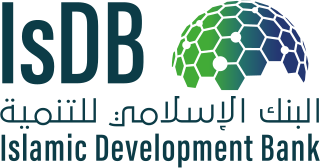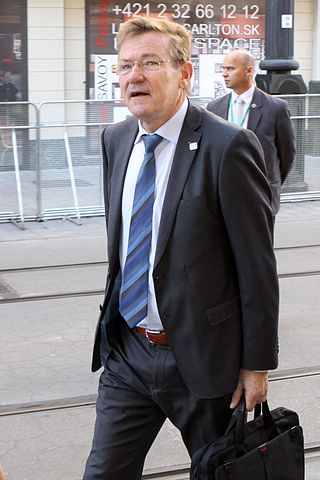Related Research Articles

The International Bank for Reconstruction and Development (IBRD) is an international financial institution, established in 1944 and headquartered in Washington, D.C., United States, that is the lending arm of World Bank Group. The IBRD offers loans to middle-income developing countries. The IBRD is the first of five member institutions that compose the World Bank Group. The initial mission of the IBRD in 1944, was to finance the reconstruction of European nations devastated by World War II. The IBRD and its concessional lending arm, the International Development Association (IDA), are collectively known as the World Bank as they share the same leadership and staff.

The European Bank for Reconstruction and Development (EBRD) is an international financial institution founded in 1991. As a multilateral developmental investment bank, the EBRD uses investment as a tool to build market economies. Initially focused on the countries of the former Eastern Bloc it expanded to support development in more than 30 countries from Central Europe to Central Asia. Similar to other multilateral development banks, the EBRD has members from all over the world, with the biggest single shareholder being the United States, but only lends regionally in its countries of operations. Headquartered in London, the EBRD is owned by 71 countries and two European Union institutions, the newest shareholder being Algeria since October 2021. Despite its public sector shareholders, it invests in private enterprises, together with commercial partners.
A special economic zone (SEZ) is an area in which the business and trade laws are different from the rest of the country. SEZs are located within a country's national borders, and their aims include increasing trade balance, employment, increased investment, job creation and effective administration. To encourage businesses to set up in the zone, financial policies are introduced. These policies typically encompass investing, taxation, trading, quotas, customs and labour regulations. Additionally, companies may be offered tax holidays, where upon establishing themselves in a zone, they are granted a period of lower taxation.

The Islamic Development Bank is a multilateral development finance institution that is focused on Islamic finance for infrastructure development and located in Jeddah, Saudi Arabia. There are 57 shareholding member states with the largest single shareholder being Saudi Arabia.

The economy of Africa consists of the trade, industry, agriculture, and human resources of the continent. As of 2019, approximately 1.3 billion people were living in 54 countries in Africa. Africa is a resource-rich continent. Recent growth has been due to growth in sales in commodities, services, and manufacturing. West Africa, East Africa, Central Africa and Southern Africa in particular, are expected to reach a combined GDP of $29 trillion by 2050.
A transition economy or transitional economy is an economy which is changing from a centrally planned economy to a market economy. Transition economies undergo a set of structural transformations intended to develop market-based institutions. These include economic liberalization, where prices are set by market forces rather than by a central planning organization. In addition to this trade barriers are removed, there is a push to privatize state-owned enterprises and resources, state and collectively run enterprises are restructured as businesses, and a financial sector is created to facilitate macroeconomic stabilization and the movement of private capital. The process has been applied in China, the former Soviet Union and Eastern bloc countries of Europe and some Third world countries, and detailed work has been undertaken on its economic and social effects.
The International Centre for Settlement of Investment Disputes (ICSID) is an international arbitration institution established in 1966 for legal dispute resolution and conciliation between international investors and States. ICSID is part of and funded by the World Bank Group, headquartered in Washington, D.C., in the United States. It is an autonomous, multilateral specialized institution to encourage international flow of investment and mitigate non-commercial risks by a treaty drafted by the International Bank for Reconstruction and Development's executive directors and signed by member countries. As of May 2016, 153 contracting member states agreed to enforce and uphold arbitral awards in accordance with the ICSID Convention.
Syrdarya Power Plant is a natural gas-fired power plant located in Shirin, Uzbekistan. Its ten units were commissioned in 1972–1981. The installed capacity of the power plant is 3,050 MW.

The Under Secretary of the Treasury for International Affairs is a senior position within the United States Department of the Treasury responsible for advising the Secretary of the Treasury on international economic issues. As of January 13, 2023, the under secretary is Jay Shambaugh.
An international financial institution (IFI) is a financial institution that has been established by more than one country, and hence is subject to international law. Its owners or shareholders are generally national governments, although other international institutions and other organizations occasionally figure as shareholders. The most prominent IFIs are creations of multiple nations, although some bilateral financial institutions exist and are technically IFIs. The best known IFIs were established after World War II to assist in the reconstruction of Europe and provide mechanisms for international cooperation in managing the global financial system.

The Black Sea Trade and Development Bank (BSTDB) is an international development finance institution serving the eleven member founding countries of the Black Sea Economic Cooperation, a regional economic organization. It supports economic development and regional cooperation by providing loans, guarantees, and equity for development projects and trade transactions. BSTDB supports both public and private enterprises in member countries and does not attach political conditionality to its financing.
A national development bank is a development bank created by a country's government that provides financing for the purposes of economic development of the country.

Just transition is a framework developed by the trade union movement to encompass a range of social interventions needed to secure workers' rights and livelihoods when economies are shifting to sustainable production, primarily combating climate change and protecting biodiversity. In Europe, advocates for a just transition want to unite social and climate justice, for example, for coal workers in coal-dependent developing regions who lack employment opportunities beyond coal.
This is a list of international organizations in which Canada has membership.

Johan Van Overtveldt is a Belgian journalist and politician of the New Flemish Alliance (N-VA). He served as Minister of Finance of Belgium from 2014 until 2018.

Vincent Van Peteghem is a Belgian economist and politician of CD&V who has been serving as Minister of Finance in the government of Prime Minister Alexander De Croo since 1 October 2020. He was a member of the Chamber of Representatives of Belgium from 2014 until 2020.